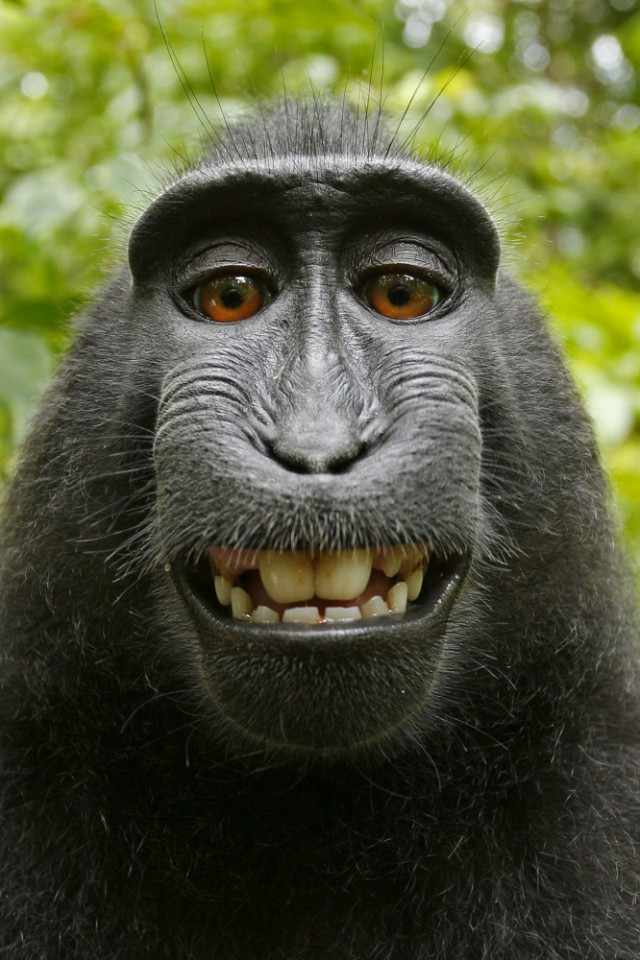
This summer, copyright law got one of its rare viral moments, thanks to a crested black macaque that took a captivating "selfie."
During a 2011 photo shoot, the monkey grabbed the camera away from British photojournalist David Slater and snapped hundreds of photos. One of them was the now-famous selfie, which made its way to Wikimedia Commons, an online storehouse of free-to-use images.
The conflict became public when Slater tried to get the picture taken down. Wikimedia denied the request and reported it in its transparency report.
Now Slater is actually trying to get a Public Knowledge blog post taken down because it uses the photo to discuss the controversy. Public Knowledge has responded, and, as you might expect, refuses to take down its post.
Public Domain doesn't work like that
The "monkey selfie" incident was covered widely in media, including on Ars.
One of many to weigh in on the issue was Sherwin Siy, who works on copyright issues for the group Public Knowledge. Siy wrote up a blog post noting that some media outlets had really blown it when it came to explaining the issue clearly. Buzzfeed, for instance, had an enticing headline suggesting that the monkey himself owned the copyright. But that just wasn't true. It seemed hard for folks to wrap their heads around the idea that some things simply aren't copyrighted at all.
"We need to stop assuming that every image, sound recording, or innovation is owned, or even ownable," wrote Siy.
Slater contacted PK yesterday saying the blog post is "factually incorrect and damaging to me." It infringes his "rights to commercialize the image/s," he added. Slater insisted that they purchase a license to show the photo, or he will "forward [the group's] details to my lawyers in the US and the UK." Even if PK does buy a license, "I will still require some amendment to the article" if one is purchased, he added.
Slater's letter reads, in part:
Your site, in my opinion, is abusing fair use and damaging the concept of public domain.
A public domain image is one in which a living author has voluntarily relinquished rights to the image. Any debate claiming acts of nature were resonsible [sic] for the image MUST be resolved in a court, and only AFTER judgement shall an image be qualified as public domain.
Public Knowledge nor Sherwin Siy nor Wikimedia have the right to decide.
Actually, they do, Siy explained in his response:
This is not true. It would be absurd for every instance of the use of public domain works to be litigated. The fact that certain works have no copyright holder (because the term of copyright has expired, because the work is not the creation of a human author, or because the work was not sufficiently fixed or sufficiently creative) means that there would be no one to definitively contest the usage in court.
Siy also disagrees with Slater's assertion that he was "damaging and disrespectful," saying:
While we clearly disagree on the scope and applicability of the law, I never insulted you or mocked you. You might note that, at the bottom of the post, I, in the interest of being even-handed, even say you have a “colorable” argument for copyrightability—more credit than many of my learned colleagues have given you... Your actions and character were not disparaged, or even mentioned, because they were not relevant to that discussion.
In a brief conversation with Ars, Siy said he hadn't heard from Slater until he got the e-mail yesterday, with the subject line "infringement notice."
Slater didn't immediately respond to requests for comment from Ars.
Copyrighted or not, Slater's photography website has put the "monkey selfie" image front and center. The site features an image of Slater holding up the monkey selfie, and offers it for sale on canvas, as well as other "World Famous Imagery," such as the "Kung-Fu Fighting Squirrels."
reader comments
362